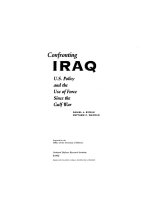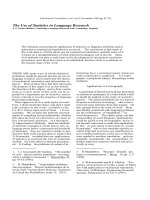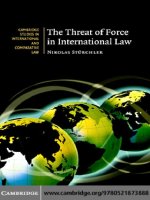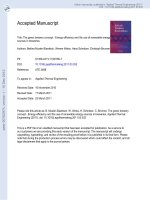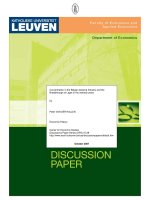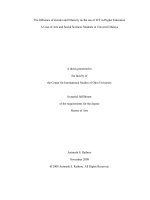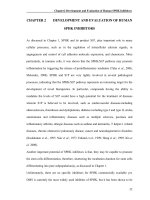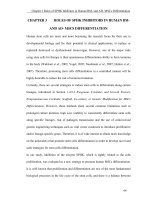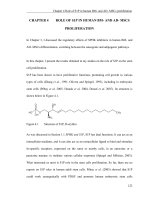Democratic Accountability and the Use of Force in International Law docx
Bạn đang xem bản rút gọn của tài liệu. Xem và tải ngay bản đầy đủ của tài liệu tại đây (2.21 MB, 468 trang )
This page intentionally left blank
Democratic Accountability and the Use of Force
in International Law
The spread of democracy to a majority of the world’s states and the legit-
imization of the use of force by multilateral institutions such as NATO
and the UN have been two key developments since the Second World
War. In the last decade these developments have become intertwined,
as multilateral forces moved from traditional peacekeeping to peace en-
forcement among warring parties. This book explores the experiences
of nine countries (Canada, France, Germany, India, Japan, Norway,
Russia, the United Kingdom, and the United States) in the deployment
of armed forces under the UN
and NATO, asking who has been
and
should be accountable to the citizens of these nations, and to the citizens
of states who are the object of deployments, for the decisions made in
such military actions. The authors conclude that national-level mecha-
nisms have been most important in ensuring democratic accountability
of national and international decision-makers.
is executive vice president and executive director of the
American Society of International Law. Her recent publications include
Global Governance and the Changing Face of International Law (2001),
“Using Military Forces under International Auspices and Democratic
Accountability” (2001), and “American Lawyers and International Com-
petence” (with Christopher J. Borgen, 2000). She is also coeditor with
Paul Diehl of the widely used collection, International Law: Classic and
Contemporary Readings (1998).
.
(1929–2001)
was, at the time of coediting this
book, Jesse Siddal Reeves professor of political science, senior research
scientist, and adjunct professor of law at the University of Michigan.
His many publications include Engaging Countries: Strengthening Com-
pliance with International Environmental
Accords
(coedited with Edith
Brown Weiss, 1998). During his distinguished career he was awar-
ded the Excellence in Education Award of the University of Michigan’s
College of Literature, Science, and the Arts; and was elected a fellow of
the American Association for the Advancement of Science from which
he also received the Award for International Scientific Cooperation.
Democratic Accountability
and the Use of Force in
International Law
Edited by
Charlotte Ku and Harold K. Jacobson
cambridge university press
Cambridge, New York, Melbourne, Madrid, Cape Town, Singapore, São Paulo
Cambridge University Press
The Edinburgh Building, Cambridge cb2 2ru, United Kingdom
First published in print format
isbn-13 978-0-521-80747-0 hardback
isbn-13 978-0-521-00207-3
p
a
p
erback
isbn-13 978-0-511-07233-8 eBook (EBL)
© The American Society of International Law 2002
2003
Information on this title: www.cambrid
g
e.or
g
/9780521807470
This book is in copyright. Subject to statutory exception and to the provision of
relevant collective licensing agreements, no reproduction of any part may take place
without the written permission of Cambridge University Press.
isbn-10 0-511-07233-3 eBook (EBL)
isbn-10 0-521-80747-6 hardback
isbn-10 0-521-00207-9
p
a
p
erback
Cambridge University Press has no responsibility for the persistence or accuracy of
urls for external or third-party internet websites referred to in this book, and does not
guarantee that any content on such websites is, or will remain, accurate or appropriate.
Published in the United States of America by Cambridge University Press, New York
www.cambridge.org
isbn-13
isbn-10
isbn-13
isbn-10
isbn-13
isbn-10 9
3
3
8
6
0
To Jake’s family and students, that his humanity
and scholarship may live on.
Contents
List of figures page ix
List of tables x
Notes on contributors xi
Prefacexix
List of abbreviations xxii
I. Introduction
1. Broaching the issues 3
.
II. The domestic and international context
2. The interface of national constitutional systems with
international law and institutions on using military
forces: changing trends in executive and legislative powers 39
.
3. Domestic political factors and decisions to use military forces 61
.
4. Collective security, peacekeeping, and ad hoc multilateralism 81
.
5. The legal responsibility of military personnel 104
. .
III. Traditional contributors to international
military operations
6. Canada: committed contributor of ideas and forces, but
with growing doubts and problems 127
vii
viii Contents
7. Norway: political consensus and the problem
of accountability 154
.
8. India: democratic, poor, internationalist 176
IV. Newcomers to international military operations
9. Japan: moderate commitment within legal strictures 207
10. Germany: ensuring political legitimacy for the use of
military forces by requiring constitutional accountability 231
V. Permanent members of the UN Security Council
11. Russian Federation: the pendulum of powers
and accountability 257
12. France: Security Council legitimacy and executive primacy 280
, ,
13. The United Kingdom: increasing commitment requires
greater parliamentary involvement 300
.
14. The United States: democracy, hegemony,
and accountability 323
.
VI. Conclusion
15. Toward a mixed system of democratic accountability 349
.
Appendix A. Uses of military forces under the auspices
of the UN and NATO 384
Appendix B. Country participation in international operations,
1945–2000 399
References 415
Index 430
Figures
1.1 Number of uses of military forces by year of
authorization (1945–2000) page 20
8.1 Force contribution decision-making flow chart 192
8.2 The structure of India’s civil–military relationship 196
ix
Tables
1.1 Uses of military forces under the auspices of the
UN and NATO page 24
1.2 Uses of force and forms of authorization and
responsibility: the framework for analysis 29
1.3 The nine states and their characteristics 30
3.1 Domestic factors that matter by form of use
of military forces 75
15.1 Mention of Chapter VII in UN Security Council
authorizations, 1990–2000 355
15.2 Forms of international authorization regarded as legitimate 360
15.3 Legislative authorization for enforcement actions 363
15.4 Conditions under which countries are willing to allow
their military forces to be deployed in international
operations 367
15.5 Acceptance of norms regarding military operations 376
15.6 Uses of military forces and forms of authorization and
responsibility 377
A.1 Uses of military forces under the auspices of the United
Nations and NATO 384
A.2 Uses of military forces under the UN and NATO
classified by conflict and locale 396
B.1 Country participation in international operations,
1945–2000 399
x
Notes on contributors
’ s thirty-six years of distinguished
service in the Indian army included service in command and staff as-
signments in all its operational environments and border areas and
includes appointments at brigade, division, field army, and army head-
quarters. From May 1, 1999, he has led the Regional Centre for
Strategic Studies, the only such institute in the region, at Colombo,
Sri Lanka, as its executive director. Banerjee’s current areas of aca-
demic interest are national security issues, confidence-building mea-
sures, Asia-Pacific security, and China’s security and foreign policies.
He has published extensively on these subjects. His recent edited vol-
umes include: South Asia at Gun Point: Small Arms and Light Weapons
Proliferation (2000); Security Studies in South Asia: Changes and Chal-
lenges (2000); CBMs in South Asia: Potential and Possibilities (2000);
Confidence Building Measures in South Asia (1999); and Comprehensive
and Co-operative Security in South Asia (1998).
. has a Ph.D. in political science from Paris University. He
was senior researcher at the French Institute for International Affairs
(IFRI), then moved to CREST as deputy director, a position he still
holds at the Fondation pour la Recherche Strat´egique, an institution
based in Paris that succeeded CREST. In his various capacities, he is
currently chairing a working group from the French Defense Science
Board dealing with forecast analysis. He is associate professor at the
French army academy as well as at the Ecole polytechnique. A former
IISS researcher and Woodrow Wilson scholar, he has published many
articles on security and defense issues in various journals (including The
Washington Quarterly, the RUSI journal, Europe Archiv, and Politique
Etrang`ere). Recent publications include his edited volume Allemagne(s):
certitudes et incertitudes de la politique de s´ecurit´e (1998).
is Henry L. Moses professor of law
and international organization at Columbia University. Her teaching
responsibilities have included public international law; the Constitution
xi
xii Notes on contributors
and US foreign affairs; and seminars on related subjects including
enforcing international law, human rights, international criminal tri-
bunals, international institutions, law and foreign intelligence, east–
west trade, and transnational litigation. She served for a number of
years in the Office of the Legal Adviser, US Department of State,
with responsibilities including legal aspects of the Iran crisis and litiga-
tion in international, foreign, and domestic tribunals. Her recent publi-
cations include: International Law: Cases and Materials (4th edn.)
(coauthored with Louis Henkin, Richard Pugh, Oscar Schachter, and
Hans Smit) (2001); Beyond Confrontation: International Law for the Post-
Cold War Era (coedited with Gennady Danilenko and
Rein Mullerson,
coauthored by pairs of scholars from the United States and the for-
mer Soviet Union) (1995); Enforcing Restraint: Collective Intervention in
Internal Conflicts (1993); Law and Force in the New International Order
(coedited with David J. Scheffer) (1991); and The International Court
of Justice at a Crossroads (1987).
. worked for several United Nations Consulta-
tive Committees at the UN headquarters in Geneva and with the In-
ternational Atomic Energy Agency in Vienna until mid-2001, when he
joined the Legal Department of the International Monetary Fund in
Washington, DC. Prior to that, he taught law in first-year tutorials at
the University of Paris II (Panth´eon-Assas), from which he received
his Ph.D. in international law in 1998. His doctoral thesis, La R´eforme
du Conseil de s´ecurit´e: l’´etat du d´ebat depuis la fin de la guerre froide,was
published by Bruylant Editions of Brussels in 2000.
. is professor of international law,
Fletcher School of Law and Diplomacy, Tufts University. From 1977 to
1980 he was legal counsel to the Senate Foreign Relations Committee.
He was the recipient of a Fulbright fellowship (Lithuania) in 1998 and
a Woodrow Wilson fellowship (2001–2). He has consulted regularly
with various governmental entities and international organizations.
Recent publications include: Limits of Law, Prerogatives of Power: Inter-
ventionism after Kosovo (2001); A Constitutional Law Anthology (1997);
United States Foreign
Relations and National Security Law
(2nd edn.)
(with Thomas M. Franck) (1993); Constitutional Diplomacy (1990);
Foreign Affairs and the U.S. Constitution (with Louis Henkin and William
D. Rogers) (1990); and United States Foreign Relations and National
Security Law (1980).
has been the associate director of the
Norman Paterson School of International Affairs since 1996. From
Notes on contributors xiii
1998 to the present he has been a senior advisory board member,
Project on Global Issues, Carnegie Endowment for International Peace,
and a senior associate, International Conflict Resolution Program,
Columbia University School of International and Public Affairs. In
1998 he was consultant to the UN organization, the War-torn Soci-
eties Project (WSP), in Geneva. He is a member of the Academic
Advisory Committee to Olara Otunnu, special representative to the UN
Secretary-General on Children and Armed Conflict. His recent pub-
lications include: Madness in the Multitude: Human Security and World
Disorder (2001); Multilateral Negotiations: Lessons From Arms Control,
Trade, and the Environment (2nd edn., 1999); Nurturing Peace: Why
Peace Settlements Succeed or Fail (1996); Unguided Missiles: How America
Buys its Weapons (1989); and Forming Economic Policy: The Case of
Energy in Canada and Mexico (1986).
. died in August 2001. He was Jesse
Siddal Reeves professor of political science and a senior research scien-
tist in the Center for Political Studies of the Institute for Social Research
at the University of Michigan. He was a specialist in international in-
stitutions and politics. He was the author, editor, or coeditor of twelve
books and numerous articles and monographs dealing with interna-
tional institutions and politics. His most recent book is Engaging Coun-
tries: Strengthening Compliance with International Environmental Accords
(edited with Edith Brown Weiss) (1998). Other publications include:
Behavior, Culture and Conflict in World Politics (coeditor and contributor
with William Zimmerman) (1994); Double Edged Diplomacy: Interna-
tional Bargaining and Domestic Politics (edited with Peter Evans and
Robert D. Putnam) (1993); China’s Participation in the IMF, the World
Bank, and GATT: Toward a Global Economic Order (with Michel
Oksenberg) (1990).
. has been executive vice president and executive di-
rector of the American Society of International Law since 1994. She
was formerly on the legislative staff of the US Senate and on the faculty
of the University of Virginia. She served recently as chair of the Board
of Directors of the Academic Council on the United Nations System
(ACUNS). Among her recent publications are: Global Governance and
the Changing Face of International Law (the John W. Holmes Memorial
Lecture, Academic Council on the United Nations System, November
2001); “American Lawyers and International Competence” (2000)
Dickinson Journal of International Law (with Christopher J. Borgen);
“International Law – New Actors and New Technologies: Center Stage
for NGOs” (2000) Georgetown Journal of Law and Policy in International
xiv Notes on contributors
Business (with John King Gamble); and International Law: Classic and
Contemporary Readings (with Paul Diehl) (1998).
has been a professor of political science at
the University of Kentucky since 1993. She has published work on
international organization and law, international political economy, in-
ternational environmental politics, and African politics. She is a mem-
ber of the International Studies Association and recently served on the
Board of Directors of the Academic Council on the United Nations
System. She has a long-standing interest in innovative teaching. Re-
cent publications include: Domestic Politics and State Participation in
Multilateral Peacekeeping: A Comparative Analysis (forthcoming); Essen-
tials of International Relations (1998); Teaching International Affairs with
Cases: Cross-national Perspectives (with Katsuhiko Mori) (1997); and
The United Nations in the Post-Cold War Era (with Margaret P. Karns)
(1995).
is professor of international law, German and
comparative public law, and director of the Institute of International
Law at the University of G¨ottingen, Germany. He practices compar-
ative constitutional law in his capacity as the substitute member for
Germany of the European Commission for Democracy through Law
(the so-called Venice Commission) of the Council of Europe. The
Commission consists of independent experts and it advises European
states, in particular central and eastern European states, in constitu-
tional matters. His recent publications include: “Constitutional Impli-
cations of German Participation in Treaty Regimes” in Delegating State
Powers: The Effect of Treaty Regimes on Democracy and Sovereignty (edited
by Thomas M. Franck) (2000); “Intolerant Democracies” (with
Gregory H. Fox) in Democratic Governance and International Law (edited
by G. Fox and B. Roth) (2000); “The Limits of the Security Coun-
cil’s Powers and its Functions in the International Legal System: Some
Reflections” in The Role of Law in International Politics, Essays in In-
ternational Relations and International Law (edited by Michael Byers)
(2000); and Eingreifen auf Einladung – Zur v¨olkerrechtlichen Zul¨assigkeit
des Einsatzes fremder Truppen im internen Konflikt auf Einladung der
Regierung [Intervention upon Invitation – Use of Force by Foreign
Troops in Internal Conflicts at the Invitation of a Government under
International Law] (1999).
. is an anthropologist who received his Ph.D. in March
1999, with a thesis entitled Community Leadership and Development Ad-
ministration in a Durban Squatter Settlement. He has performed research
Notes on contributors xv
in South Africa and has taught seminars at the Institute and Museum
for Anthropology at the University of Oslo and at Cambridge Univer-
sity. Recent publications include “Development: The Devil We Know?”
Third World Quarterly (2001); and “The Instrumentalisation of Devel-
opment Knowledge” (with Ole J. Sending) in Banking on Knowledge
(edited by D. Stone) (2001).
. . . is head of Research and Consultancy at the
T. M. C. Asser Institute in The Hague. He is also the general coor-
dinator of the Asser Dissertations Programme. He is general editor of
International Peacekeeping (Kluwer Law International). He has written
numerous articles in domestic and foreign law journals, and for Dutch
newspapers on the legal and political aspects of international peace
and security, with an emphasis on the UN and European security is-
sues. Recent publications include National Contingents in United Nations
Peace-keeping Forces (1991); and Basic Documents on United Nations and
Related Peace-keeping Forces (2nd edn.) (1989).
has been associate professor of international
law at Okayama University from 1995. He was a senior fellow at the
Center for International Studies of the New York University School of
Law in 1993 and 1994. He is currently serving as a legal advisor at the
Permanent Mission of Japan to International Organizations in Geneva.
Recent publications include: United Nations Peace-keeping Operations:
A Guide to Japanese Policies (with L. William Heinrich and Yoshihide
Soeya) (1999); “Participation japonaise aux op´erations de maintien de
la paix de l’ONU” (1999) 6–7 Perspectives asiatiques; “Legitimacy and
Justice in International Law: The Thrust and Probl´ematique of Pro-
fessor Franck’s Fairness Discourse” (1998) 47 Okayama Law Journal;
“Japanese Peacekeeping Legislation and Recent Developments in U.N.
Operations” (1994) 19 The Yale Journal of International Law.
is Leon Benwell professor of law and inter-
national relations at the University of Southern California Law Center.
He teaches arms-control agreements, foreign relations law, interna-
tional law and international relations theory, and international orga-
nizations. Prior to joining the faculty at Southern California, he was
special counsel for foreign policy in the office of US Senator Daniel
Patrick Moynihan. He served as chair of the Board of Directors of
the Academic Council on the United Nations System from 1996 to
1998. Among his recent publications are “UN Task-sharing: Toward
or Away from Global Governance” (with Thomas G. Weiss) in Beyond
UN Subcontracting: Task-sharing with Regional Security Arrangements
xvi Notes on contributors
and Service-providing NGOs (edited by Thomas G. Weiss) (1998);
“The United Nations and NATO: The Limits on Cooperation be-
tween International Organizations” in Trilateral Perspectives on Inter-
national Legal Issues: Relevance of Domestic Law and Policy (edited by
Michael K. Young and Yuji Iwasawa) (1996); “Collective Security and
Collective Defense: Changing Conceptions and Institutions” in The
United Nations in a New World Order (Claremont McKenna College
Monograph Series
6, 1993).
, Agr´eg´e des Facult´es de Droit (France), is teach-
ing international law and international relations at University Panth´eon-
Assas (Paris II). He directs the Centre Thucydide-Analyse et recherche
en relations internationales at this University and is director of the
Annuaire fran¸cais de relations internationales (AFRI). He was previ-
ously deputy director of UNIDIR (the United Nations Institute for
Disarmament Research) at Geneva (1986–96). In this capacity he has
written or edited numerous works on disarmament, arms control, and
international security, including several books devoted to the problems
of monitoring, verification, and compliance of treaties on arms limi-
tations. Among his main and recent academic publications are: Droit
international public (with Jean Combacau) (5th edn., 2001); Relations
internationals (2nd edn., 2000); “Le Recours `a la force dans l’affaire du
Kosovo et le droit international” (Les Notes de l’IFRI, no. 22, 2000).
. is the vice rector (Peace and Governance) of the
United Nations University in Tokyo. He was formerly professor and
head of the Peace Research Centre at the Australian National Univer-
sity in Canberra (1995–8), and professor of international relations and
director of Asian studies at the University of Otago in New Zealand
(1980–95). A former member of the National Consultative Commit-
tee on Peace and Disarmament in Australia, and of the Public Advi-
sory Committee on Arms Control and Disarmament in New Zealand,
he is one of the Commissioners of the International Commission on
Intervention and State Sovereignty (ICISS). He is the author/editor
of eighteen books, the most recent being United Nations Peacekeeping
Operations: Ad Hoc Missions, Permanent Engagement (2001); Kosovo and
the Challenge of Humanitarian Intervention: Selective Indignation, Col-
lective Action, and International Citizenship (2000); and Past Imperfect,
Future UNcertain: The United Nations at Fifty (1998). He has written
over 150 articles for journals and chapters for books, including “India
in the World: Neither Rich, Powerful, nor Principled” in Foreign Affairs
(July/August 1997). He also writes periodically for the quality press,
including the Australian, the Australian Financial Review, the Asian Wall
Notes on contributors xvii
Street Journal, the Globe and Mail, the International Herald Tribune, and
the Japan Times.
. is a researcher at the Norwegian Institute of Inter-
national Affairs. He is a political scientist from the London School of
Economics and Political Science and the University of Oslo. Thune has
published articles on international theory, ethical and normative issues
related to humanitarian interventions, security theory, and Norwegian
foreign policy. Recent publications include The Sanctions Debate. UN
Sanctions in the 1990s (2000) and After Srebrenica (edited with Vegard
Hansen) (1998).
. is the international law counselor of
the Constitutional Court of
the Russian Federation. He concurrently
serves as docent (associate professor) of international law at the Diplo-
matic Academy of the Russian Foreign Ministry and at the Moscow
State Linguistic University. He is deputy editor-in-chief of the Moscow
Journal of International Law and a member of the Board of the Russian
Association of International Law. His international activities include a
tour of duty with the UN
Protection Force in the former Yugoslavia.
His recent publications in English include: “Russian Forces in the
Commonwealth of Independent States” in The Handbook of the Law
of Visiting Forces (edited by Dieter Fleck) (2001); and “The Legal
Framework of CIS Regional Peace Operations” (2000) International
Peacekeeping.
. has been professor of international orga-
nizations law at Nottingham University since 2000. He is coeditor of
the Journal of Conflict and Security Law published by Oxford University
Press. Recent publica
tions include
The United Nations
System: Toward
International Justice (2002); Keeping the Peace: The United
Nations and
the Maintenance of International
Peace and Security
(2nd edn.) (1997);
The Blue Helmets: The Legal Regulation
of UN Military Operations
(with
H. McCoubrey) (1996); The Law of International Organisations (1996);
International Law and Armed Conflict (with H. McCoubrey) (1992);
and The United Nations and the Maintenance of International Peace and
Security (1990).
Preface
Harold Jacobson died unexpectedly as we neared completion of this book,
but Jake and I had finished final drafts of the opening and closing chapters
and we had received all the other chapters and worked through them
together. So the work remains as it began, a joint effort, codirected and
coedited by the two of us.
This project had its origins in an on-going conversation that Jake and
I began in late 1995 about the role of international institutions after
the end of the Cold War. We both observed that the world had been
unprepared for the post-Cold War world, and that this lack of preparation
had handicapped the important institutions and powers in handling the
problems that emerged after 1991. Since there had been no concept of or
opportunity for post-war planning, as there had been during the First and
Second World Wars, there was no coherent vision of what the post-Cold
War world, including its international institutions, should look like.
We considered what questions demanded an answer, and concluded
that an important but not well-understood issue was how democracies
maintained accountability to their citizens when they acted under the
auspices of international institutions. As Americans, we thought of the
rallying cry of the American colonists against Westminster, “No taxation
without representation,” as capturing the right of citizens of democratic
countries to understand and to shape their country’s international obliga-
tions. The question seemed simple, but we soon discovered the complex-
ity of undertaking research in this area because of the academic tradition
of exploring international and national political and societal issues sepa-
rately. Nevertheless, we knew that we had to attempt the analysis because
the world’s democracies
have the military power and responsibility to use
force under international auspices. They also have an obligation to their
citizens to make transparent decisions that conform to tenets of demo-
cratic accountability. We needed to understand how domestic politics
might be used to ensure the effective implementation of decisions made
by international institutions by strengthening national commitment to
those institutions and popular support for their decisions.
xix
xx Preface
We began our discussion with an open and congenial international team
of authors in September 1998 at Airlie House in Warrenton, Virginia.
Our colleagues listened, considered, and brought their wisdom and
experience to refining and probing the questions that Jake and I posed
to them. We met again in Glen Cove (New York), Bermuda, and Bergen
(Norway). With each meeting, the project gained definition and depth.
Our colleagues whose disciplinary home is in international law com-
plemented our inter
national relations and political science orientations;
our non-law colleagues added valuable insight into the political and
societal context in which law operates. We are grateful to all of
them.
We are grateful to the many individuals who took the time to talk
with us. They included officials at the headquarters of the North Atlantic
Treaty Organization (NATO) in Brussels,
with whom we spoke soon after
the 1998 Activation Order that led to Operation Allied Force; the Sec-
retariat and delegation members at the United Nations headquarters in
New York; and academics, legislators, military officials, and policy mak-
ers in many of the countries included in this study. We benefited greatly
from their insights and perspectives. Since we agreed that all information
generated from the interviews would be used without attribution, we do
not list these individuals here by name.
We were fortunate to have a team of informal advisers who reviewed
materials as they developed and offered helpful suggestions and refine-
ments throughout the project. These included James Sutterlin (Yale
University), Oscar Schachter (Columbia University), Jos´e Alvarez
(Columbia University), Anne Julie Semb (Norwegian Institute of Inter-
national Studies), William Durch (Henry L. Stimson Center), Maurice
Copithorne (University of British Columbia), and Edwina Campbell
(Industrial College of the Armed Forces, National Defense University).
Special thanks are owed to Dr. Campbell, who provided invaluable
com-
ments on various drafts of the book.
We are grateful to the American Society of Inter
national Law for its
sponsorship of this project,
the latest in a long line of studies produced
under ASIL auspices that brought
together a multinational and multidis-
ciplinary team to examine an issue of contemporary significance. From
Dayton to September 11, 2001, the course of this project seemed to span
the entire spectrum of modern conflict, from peacekeeping to war. This
gave the study an immediacy that reinforced the relevancy of its issues,
but also made their assessment somewhat harder. As editors, we were cog-
nizant that our discussion needed to stand the test of time, even though
we were studying a highly contemporary
set of questions. The bulk of
the research and analysis was completed prior to September 11, 2001,
Preface xxi
but few changes were made as the premises and conclusions of the study
remain relevant to the post-September 11 world.
We wish to thank the staff of the American Society of International
Law, who provided research and administrative support, especially the
contributions of Jill Watson, Kuldip Singh Dosanjh, Sandra Liebel, Edra
London, and Trish Thomas. We also thank the Center for Political Stud-
ies at the University of Michigan for research and administrative support,
especially Laur
ie Pierson for her careful preparation of the manuscript.
The help of the Center’s director, William Zimmerman, and Barbara
Opal made it possible for me to finish the work that Jake and I began,
and
I am grateful to both of them.
This project was an amiable and enriching intellectual experience,
thanks to our contributors, the Ford Foundation, which made our work
possible,
and Cambridge University Press, especially its law senior com-
missioning editor, Finola O’Sullivan.
The project started as a conversation between two people and grew
to include scores who contributed to our understanding of accountabil-
ity, democracy, and international institutions. We hope that our collective
efforts offer a new approach to the complex interaction of national and in-
ternational institutions in providing accountability to citizens for actions
their countries take under international auspices. Jake and I concluded
on an optimistic and hopeful note that democracy, accountability, and
international institutions are not incompatible concepts, that a “mixed
system” of national and international accountability is in the process of
being crafted.
In Jake’s memory, my project colleagues and I dedicate this work to
his family and to his many students, in the hope and expectation that his
humanity and scholarship will live on.
Washington, DC
Disclaimer
The publisher has used its best endeavours to ensure that the URLs for
external websites referred to in this book are correct and active at the
time of going to press. However, the publisher has no responsibility for
the websites and can make no guarantee that a site will remain live or that
the content is or will remain appropriate.
Abbreviations
CESDP Common European Security and Defense Policy
CFSP Common Foreign and Security Policy
CIS Commonwealth of Independent States
CPSU Communist Party of the Soviet Union
CSCE Conference on Security and Cooperation in Europe
DOMREP Mission of the Representative of the
Secretary-General in the Dominican Republic
DPKO United Nations Department of Peacekeeping
Operations
ECOWAS Economic Community of West African States
EDC European Defense Community
ESDI European Security and Defense Identity/Initiative
ESDP European Security and Defense Policy
EU European Union
ICC International Criminal Court
ICJ International Court of Justice
ICRC International Committee of the Red Cross
ICTY International Criminal Tribunal for the Former
Yugoslavia
IFOR NATO-led Implementation Force
INTERFET International Force in East Timor
KDOM/KVM Kosovo Diplomatic Observer Mission/Verification
Mission
KFOR Kosovo Force
KLA Kosovo Liberation Army
MFO Multinational Force and Observers, Sinai
MIF Maritime Interdiction Force
MINUGUA United Nations Verification Mission in Guatemala
MINURCA United Nations Mission in the Central African
Republic
MINURSO United Nations Mission for the Referendum
in Western Sahara
xxii
List of abbreviations xxiii
MIPONUH United Nations Civilian Police Mission in Haiti
MISAB Mission to Monitor the Implementation of the
Bangui Agreements
MNF Multinational Force
MONUA United Nations Observer Mission in Angola
MONUC United Nations Organization Mission in the
Democratic Republic of Congo
MPF Multinational Protection Force
NAC North Atlantic Council
NAM Non-Aligned Movement
NATO North Atlantic Treaty Organization
NGO Non-governmental organization
OAS Organization of American States
OAU Organization of African Unity (now the African
Union)
ONUC United Nations Operation in the Congo
ONUCA United Nations Observer Group in Central America
ONUMOZ United Nations Operation in Mozambique
ONUSAL United Nations Observer Mission in El Salvador
ONUVEH United Nations Observer Group for the Verification
of the Elections in Haiti
OSCE Organization for Security and Cooperation
in Europe
OSGAP Office of the Secretary-General in Afghanistan
and Pakistan
P-5 Five permanent members of the UN Security
Council
PDD-25 Presidential Decision Directive 25
RECAMP Reforcement des Capacit´es Africaines de
Maintien de la Paix
ROE Rules of engagement
RPF Rwandan Patriotic Front
SACEUR Supreme Allied Commander, Europe
SEATO Southeast Asian Treaty Organization
SFOR Stabilization Force (NATO)
SOFA Status-of-forces Agreement
UNAMET United Nations Mission in East Timor
UNAMIC United Nations Advance Mission in Cambodia
UNAMIR United Nations Assistance Mission for Rwanda
UNAMSIL United Nations Observer Mission in Sierra Leone
UNASOG United Nations Aouzou Strip Observer Mission
UNAVEM I United Nations Angola Verification Mission I
